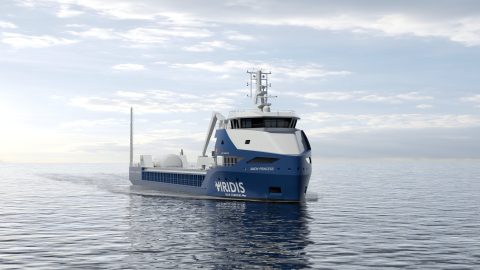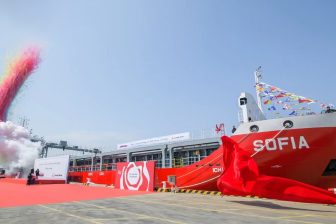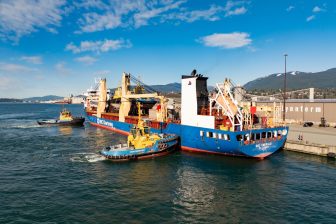
Stema Shipping joins Flexbulk – NH3 power project
Stema Shipping has become another company in the list of cargo owners to join Viridis Bulk Carriers in the Flexbulk – NH3 power project. Following the signing of the memorandum of understanding with Viridis Bulk Carriers, Stema Shipping joins the likes of Elkem, Vestkorn, Yara, BioMar, Franzefoss Minerals, Viken AT Market and Saltimport.
“Stema Shipping A/S is happy to announce that we decided to join the FlexBulk project – NH3 Power. With this opportunity we get a chance together with the project partners to be part of a very ambitious project to launch a fleet of zero emission short sea bulk carriers,” says Jens Madsen, Head of Chartering at Stema Shipping.
“The FlexBulk project is very interesting as it takes the full value chain into consideration from bunkering stations, full logistic setup and a fleet built for the future. The program shows to be a great fit for Mibau Stema Group due to the trading area and our logistic terminal setup within same. Furthermore the project aim to reduce CO2 emissions in logistics, would be an important step towards Mibau Stema Group’s sustainability targets,“ Madsen said.
Increasing cargo volume in the Flexbulk project
The eight charterers represent a significant cargo volume in the North European short sea bulk market. The underlying cargo volume from these 8 charterers provides excellent opportunity to optimise and increase productivity in the logistics chain.
The project has as a clear goal to reduce the cost impact of utilising carbon free ammonia fuel, which may initially be more expensive than fuels used today. Realisation of the project will have a significant impact on local pollutants and global CO2 emissions from shipping, in addition to reducing value chain emissions for food, fish feed, metals, fertiliser, construction, and other industries which transport large bulk and special project cargo volumes.
“We are very pleased to welcome Stema Shipping to our Flex-Bulk Project. Stema is a significant player in the European short-sea market, and offers cargo volumes that fits perfectly together with the other seven charterers in the project. As the development of our new fleet is moving into the next phase, we are happy to see that more cargo owners are getting aware of the challenges laying ahead, says Espen Nordstrøm at Viridis Bulk Carriers. “Replacing the aging short sea tonnage, and decarbonisation of the supply chain will be decisive factors for the industry in the years to come, and Viridis Bulk Carriers will provide both.”
Ammonia-powered ships provide trading flexibility
Since the start of the project in 2020 considerable technical development, design iterations and optimising of the vessel design have been achieved. This means that the Viridis vessels will support charterers cargo capacity needs, have similar sailing range as the current fleet of short sea bulk vessels > 3,000 nm, and maintain crew and societal safety at the level of conventional vessels. Viridis Bulk Carriers expect to place orders for ships during 2023, with deliveries starting in 2025.
“As the maritime industry is moving towards zero emissions it’s essential that green vessels will be able to support the operational needs and flexibility the charterers require. This means that the green vessels of tomorrow must have similar operational capacities, like cargo intake and sailing range, for this to have a large uptake. The Viridis vessels will be able to trade the full North European region without needing a full-scale development of bunker infrastructure from day one. Ammonia has by far the best energy density of the zero carbon alternatives to support this. This is the only way that the decarbonization of the maritime industry will be able to move at speed, “ says Karl Arthur Bræin, at Viridis Bulk Carriers
As EU and IMO is increasing their emission reduction targets for the maritime industry, Viridis will meet new regulation and provide the charterers with superior GHG reduction, while still offering flexibility due to sailing range in excess of 3,000 nm. Viridis Bulk Carriers is also a consortium member of “Ammonia Fuel Bunkering Network”, which will build a bunkering network in Scandinavia in collaboration with Yara. The first terminal will be delivered in 2024 as part of the Green Platform backed project. Yara have pre-ordered an additional 15 bunkering terminals for the Scandinavian market. This ensures delivery security for ammonia fuel to the Viridis Bulk Carriers fleet. Environmentally ambitious cargo owners are welcome to join
“We are extremely pleased to see that the Flexbulk – NH3 power project have grown to 8 ambitious charterers and Viridis Bulk Carriers will provide a carbon free solution for their logistical requirements. Together, we invite all environmentally ambitious cargo owners to collaborate with us. Zero emission shipping will be enabled through economies of scale, and our door is open for everyone who finds this interesting,” says André Risholm at Viridis Bulk Carriers.
You just read one of our premium articles free of charge
Register now to keep reading premium articles.




